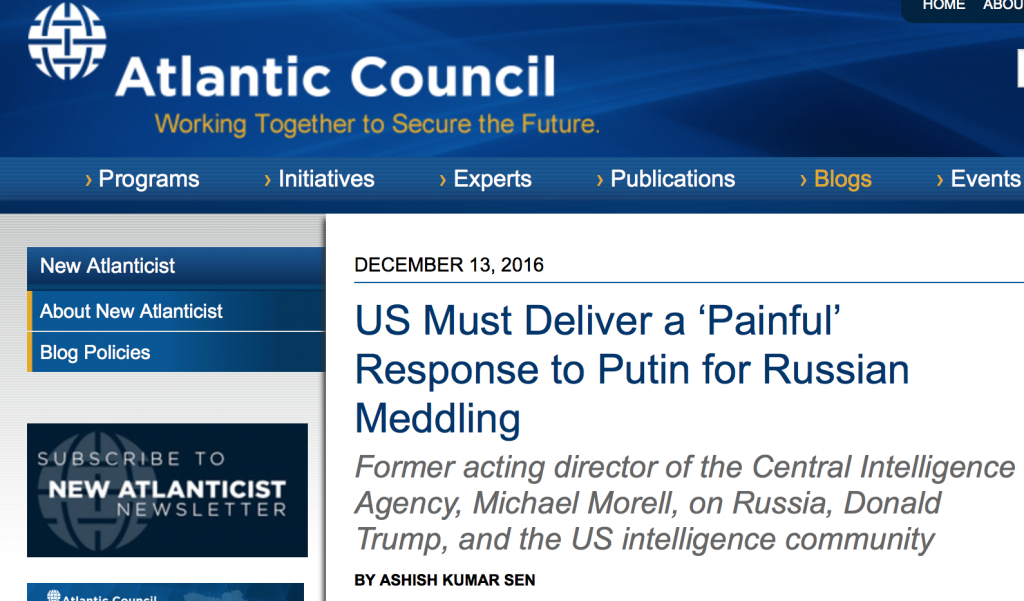CIA Former Deputy Director Called for Washington to Deliver a “Painful to Putin” Blow One Week Prior to Ambassador Assassination

On the evening of Monday the 19th of December, a day before Russia, Turkey and Iran were scheduled to meet in Moscow to discuss the Syrian conflict, the Russian Ambassador to Turkey, Andrey Karlov, was assassinated while speaking at an art exhibition in Ankara. The assailant has been identified as Mevlut Mert Altıntas, a 22-year-old off-duty Turkish police officer, who reportedly had just returned to duty last month after being suspended over suspected knowledge of the failed July coup attempt.
Video footage of the attack shows Altintas shouting ‘Allahu Akbar’ moments after shooting Karlov, in addition to yelling: “Don’t forget Aleppo; don’t forget Syria!” According to certain pro-government newspapers in Turkey, Altıntas may have had ties to the Gülen movement, a movement led by the US-based cleric, Fethullah Gülen. The CIA has been intimately connected to the Gülen movement for years, as the author F. William Engdahl has extensively documented.
Just a Coincidence?
Six days prior to the assassination, the hawkish former Deputy Director of the CIA (who also served as the Acting Director twice), Michael Morell, called for the US to respond to alleged Russian meddling in the US election by retaliating in a way that was both “overt” and “painful to Putin.” It should be noted that the whole narrative of Russia meddling or hacking is a faux one, as no proof has been presented to the public thus far, and is merely the latest effort to demonize Moscow due to the fact that Russia prevented the West and their allies forcing regime change in Damascus. In reality, Morell was advocating retaliation against Russia because Moscow had the audacity to stand up to the US in the Middle East, not because Russia meddled in the US election. Speaking to the Atlantic Council – a Washington-based think tank – on the 13thof December, Morell said:
In order for a US response to actually result in deterrence two things have to be true: one, it has got to be overt, it has got to be seen; and two, it has got to be painful to Putin. That responsibility for responding to what the Russians did here is largely that of the Obama administration because it happened on their watch. I am a little concerned that the response is going to fall through the cracks of the transition, just the way the US response to the [USS] Cole bombing [on October 12, 2000] fell through the cracks of the transition between the Clinton administration and the Bush administration.
Perhaps Morell’s comments and the assassination were unrelated, and the shooting was carried out on behalf of militants in retaliation for the Russian military campaign in Syria without the CIA’s knowledge; but then again, perhaps they were related, and the CIA in coordination with other intelligence agencies were involved in the assassination. Franz Klintsevich, the First Deputy Chairman of the Committee on Defense and Security at the Russian Federation Council, has questioned whether the West was involved in the shooting, saying that “representatives of NATO secret services” may have been be behind it.
Morell’s comments certainly reveal the kind of strategic discussions that were (and are) taking place in think tank circles in the West. We know for sure that the assassination was both “overt” and “painful to Putin,” as the shooting took place in a highly public place and Putin had a fairly close relationship with Karlov. The Russian President said in a statement that Karlov was a “good-hearted person” that he knew “personally,” in addition to stating that the assassination was an attempt to disrupt the Russian-Turkish rapprochement and the resolution of the Syrian conflict:
Ambassador Karlov was a very good-hearted person; I knew him personally, so I’m not speaking from hearsay. Last Autumn, during my visit to Turkey, Ambassador Karlov accompanied me all the time. This murder is clearly a provocation aimed at undermining the improvement and normalization of Russian-Turkish relations, as well as undermining the peace process in Syria promoted by Russia, Turkey, Iran and other countries interested in settling the conflict in Syria.
Recep Tayyip Erdoğan, the Turkish President, also called the assassination a “provocation,” as well as describing the incident as a “false flag attack:”
I believe this is an attack on Turkey, the Turkish state and the Turkish people, and also a clear provocation … [in terms of] Turkish-Russian relations. I am sure our Russian friends also see this fact. Both Turkey and Russia have the will not to be deceived by this false flag attack.
Since Erdoğan apologized to Putin for shooting down a Russian plane on the Turkish-Syrian border in November 2015, Moscow and Ankara have been trying to rebuild ties. Although it has not always been a smooth path, Russia and Turkey appear to be moving closer to each other. The agreement between Ankara and Moscow over the Turkish Stream project – a natural gas pipeline that would run from Russia to Turkey via the Black Sea, and potentially be extended into southeast Europe – is illustrative of the improvement in relations between the two countries. If Turkey, Russia and Iran manage to forge an agreement over Syria, this will bring the Syrian conflict much closer to being resolved, considering the role Turkey has played in supporting the rebels in neighboring Syria.
There was a clear motive for certain factions within the CIA and other intelligence agencies to attempt to impede the Turkish-Russian rapprochement, and disrupt the potential of an alliance between Turkey, Russia and Iran emerging. The shooting may also be an attempt to send a message to Putin that figures close to him can be assassinated with ease. We should not forget that Putin’s favorite driver was killed in a freak road accident in September.


